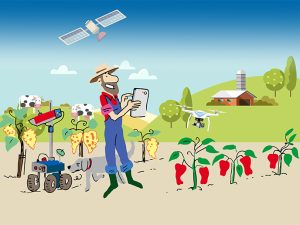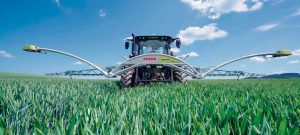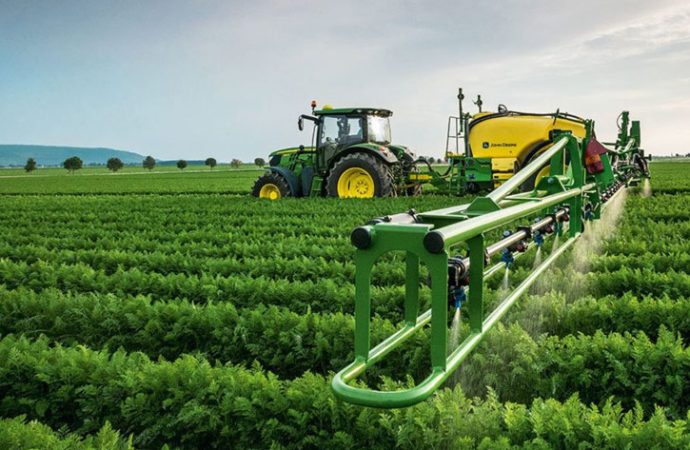Farming has always been a craft that requires patience, skill, and an understanding of nature’s rhythm. However, modern challenges like climate change, population growth, and soil degradation are reshaping agricultural landscapes. Enter Precision Farming—an innovation that empowers farmers to optimize resources, maximize yield, and protect the environment with the help of smart technologies. This blog
Farming has always been a craft that requires patience, skill, and an understanding of nature’s rhythm. However, modern challenges like climate change, population growth, and soil degradation are reshaping agricultural landscapes. Enter Precision Farming—an innovation that empowers farmers to optimize resources, maximize yield, and protect the environment with the help of smart technologies.
This blog will unpack the world of precision farming by exploring how smart agriculture is revolutionizing efficiency. We’ll cover the technologies driving this change, real-world success stories, environmental and economic benefits, and the challenges that lie ahead.
Precision Farming

Image by Yandex.com
Precision farming, also called precision agriculture, is an approach that uses data, technology, and analytics to enhance the productivity and sustainability of agriculture. By gathering precise information about variables such as soil conditions, moisture levels, and crop health, farmers can make informed decisions rather than relying on guesswork or traditional methods.
For example, instead of watering an entire field uniformly, precision farming allows targeted irrigation specifically to areas that need it. The result? Reduced water waste, lower costs, and healthier crops. This principle extends to every aspect of farming, from planting seeds to applying fertilizers and monitoring livestock.
The Role of Smart Agriculture in Enhancing Efficiency
Smart agriculture, the technology-enabled subset of precision farming, takes efficiency to the next level. It incorporates advanced tools like sensors, autonomous machinery, drones, and artificial intelligence (AI) to adapt farming practices based on real-time data.
Here’s how smart agriculture boosts efficiency across key areas of farming:
- Resource Allocation: Farmers determine the exact amount of water, fertilizers, or pesticides each crop requires.
- Productivity Gains: Equipment such as autonomous tractors and harvesters work faster and with higher precision.
- Reduced Labor Dependence: Automation replaces repetitive tasks, allowing farmers to focus on strategic decisions.
- Proactive Problem-Solving: Smart systems identify issues like pest infestations or nutrient deficiencies early on, enabling timely interventions.
Adopting these practices minimizes waste, lowers production costs, and improves the overall quality of produce.
Technologies Driving Precision Farming
The foundation of precision farming lies in cutting-edge innovations. Here are some of the most impactful technologies shaping this field:
1. IoT Sensors
Internet-enabled sensors collect data on soil moisture, pH levels, weather conditions, and crop health. These insights help farmers maintain optimal growing conditions and anticipate environmental changes.
2. Drones & Satellite Imagery
Equipped with cameras and sensors, drones provide aerial views of fields, capturing images and data related to plant health, pest activity, and irrigation coverage. Satellite imagery complements drones by monitoring large-scale areas and identifying broader trends.
3. GPS & GIS Systems
Global Positioning System (GPS) and Geographic Information Systems (GIS) allow farmers to map fields accurately and track machine movements during planting, fertilizing, or harvesting. This technology ensures precision and avoids overlaps or gaps.
4. Data Analytics & AI
Big data platforms and AI algorithms analyze farming data. AI-powered decision-making tools then provide actionable recommendations for planting schedules, optimal crop rotations, and resource application.
5. Automated Machinery
Autonomous tractors, seeders, and harvesters equipped with sensors and machine learning reduce human error and perform tasks with greater accuracy.
6. Smart Irrigation Systems
Connected irrigation devices deliver water exactly where and when it’s needed. Some systems even integrate local weather forecasts to adjust watering schedules dynamically.
Case Studies of Successful Precision Farming
Smart Irrigation in California Vineyards
A vineyard in California reduced water usage by 25% by installing IoT-enabled soil moisture sensors. The system delivered water to grapevines only when required, improving both yield quality and operational efficiency.
Drones Saving Crops in India
Farmers in Maharashtra used drones to monitor millions of acres of sugarcane plantations. The drones identified pest-infested areas with remarkable accuracy, reducing pesticide use by 40% and saving crops worth millions.
Case Study 3: Autonomous Tractors in Canada
Agricultural operations in Canada deployed autonomous tractors for planting and harvesting. These machines required less fuel, kept errors to a minimum, and allowed farmers to manage larger areas of land efficiently.
These examples demonstrate that precision farming is not just a theoretical concept but a proven practice transforming agriculture globally.
Environmental and Economic Benefits of Precision Farming

Image by Yandex.com
Adopting precision farming is about more than just farm profitability—it plays a significant role in environmental conservation and economic sustainability:
Environmental Benefits:
- Reduced Chemical Usage: Smart technologies ensure fertilizers and pesticides are used only where needed, reducing environmental contamination.
- Water Conservation: Precision irrigation cuts water use by up to 50%, critical in water-scarce regions.
- Lower Carbon Footprint: Streamlined operations reduce machinery emissions and energy consumption.
Economic Benefits:
- Higher Yields: Farmers produce a greater quantity of higher-quality crops with fewer inputs.
- Cost Savings: Resource optimization translates to lower operational costs.
- Market Competitiveness: Superior yields give farmers a competitive edge in global markets.
Challenges and Future of Precision Farming
While promising, precision farming comes with its challenges, many of which require ongoing innovation and collaboration:
- High Initial Investment
Advanced hardware and software systems can be costly, making adoption difficult for small-scale farmers. Subsidies and financial assistance programs can bridge this gap.
- Technical Literacy
Using IoT systems, AI, and automated machinery requires training. Simplifying interfaces or offering farmer-focused workshops can address this challenge.
- Data Privacy
With vast amounts of farming data being collected, data security becomes an issue. Standards for data transparency and ownership must evolve alongside these technologies.
- Infrastructure Needs
Rural areas often lack internet connectivity and power reliability, essential for precision farming technologies to work efficiently.
However, the future looks bright with ongoing advancements in affordable tech solutions and scalable implementations. Innovations like blockchain-based traceability and carbon-credit programs for sustainable farming will add even more value.
A Smarter Path Forward for Agriculture
Precision farming is undeniably shaping the future of agriculture, addressing both age-old challenges and modern-day concerns. By enhancing efficiency through smart technologies, it promises a new era of sustainable farming that benefits not only farmers but also society and the planet.
Interested in taking your farming operations to the next level? Explore the latest precision farming technologies to stay ahead. Together, let’s ensure the future of agriculture is as sustainable as it is innovative.
















